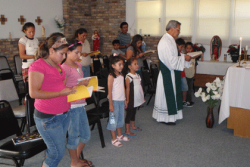Diaconate candidates prepare for ordination

SALT LAKE CITY - Every other Saturday for the past four years, 21 men from throughout the Diocese of Salt Lake City have gathered to study their faith and learn to serve. In January, those men will prostrate themselves at the Cathedral of the Madeleine before being ordained as deacons. The early Church made use of deacons but the office was dropped sometime around the third century and wasn’t brought back until the changes of Vatican II. Now, about 50 men serve the Diocese of Salt Lake City as deacons, celebrating the Sunday Liturgy in the Absence of a Priest, performing baptisms and marriages, and officiating at grave side services. "It’s holy orders," said Deacon Forest Gray, who was ordained five years ago. "It’s something that’s imprinted on your soul; you die with it. It’s throwing your hat in toe basket when it comes around, or the collection plate, and there it goes. That’s your soul. It just left. When you give yourself up to ordination, you are a cleric and you’re part of the hierarchy." However, he added, the deacon is at the bottom of the hierarchy. The word deacon means to serve, said Holy Cross Sister Patricia Riley, director of the diocese’s deacon formation program. To qualify, a man must be between the ages of 35 and 69, with a stable home and work environment, and be a practicing Catholic who is active in his parish and known by his pastor. Then there are the intangible qualities: being prayerful, having a discerning heart and "a certain presence," Sister Patricia said, as well as "really being called by God, and willing to discern the call." The program starts with a study of prayer. "The first six to eight months is called the aspirancy," Sister Patricia said. "It’s a time when you are aspiring, praying; you’re discerning to see if you are called to this. It’s got to come from prayer. Otherwise, it could just be a job." Additional study concentrates on Church history, the Scriptures and ecclesiology, among other topics. The men about to complete the program also have completed a practicum in a parish other than their home parish. Originally, 44 men were considered for the program, but with home visits, psychological testing, and background and reference checks, the group was narrowed to 24. Of those two dozen, one was killed in an automobile accident, one left the program after his wife became ill and another dropped out because of work commitments. While deacons, unlike priests, are allowed to be married when they’re ordained, they’re not allowed to marry after taking orders. Also, if their wife dies after they’re ordained, they can’t remarry. Sunday Espinoza, a parishioner at St. Peter and Paul in Salt Lake City, thought when he was younger that he might become a priest, but didn’t feel ready for the seminary. Still, he felt called to a vocation. "Over the years, even after I got married, I couldn’t shake that," he said. He applied for the diaconate program and "it’s been a fit ever since," he said, adding that the best part of the program is "being able to share our collective yearning for a vocation with our classmates. I can’t say I’ve experienced anything difficult about it. It’s just been so alive." Susan Espinoza, Sunday’s wife, said she was thrilled that she and the other wives were encouraged to go through the classes with their husbands. "Especially here in Utah, there aren’t a whole lot of places where you can sit down and talk deeply about your faith," she said, adding that she’s developed "fantastic friendships" with the other wives. And, she said, the experience has helped her understand what her husband is going through. After the classes, "We talk about it all the way home." For those considering a vocation to the diaconate, Deacon Gray has one word of advice. "Pray," he said. "Pray. Above all, pray. The most important thing a deacon or a lay minister does is prayer. That’s the basis of lay Eucharistic ministry, of lay ministry, and of the diaconate, of the priestly ministry, of any ministry, is prayer. You’re a clanging cymbal in the wind if you’re not praying. You’re just knocking yourself out for nothing."
© Copyright 2025 The Diocese of Salt Lake City. All rights reserved.

Stay Connected With Us